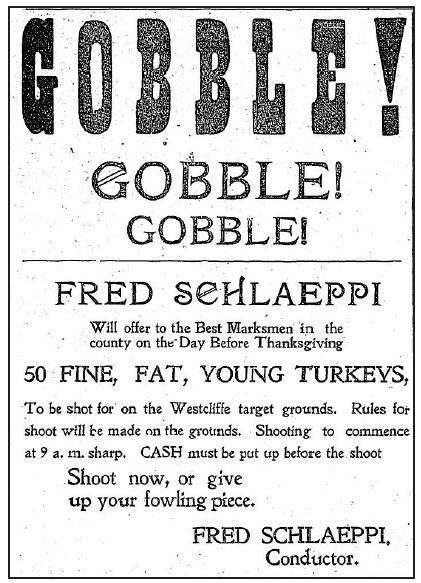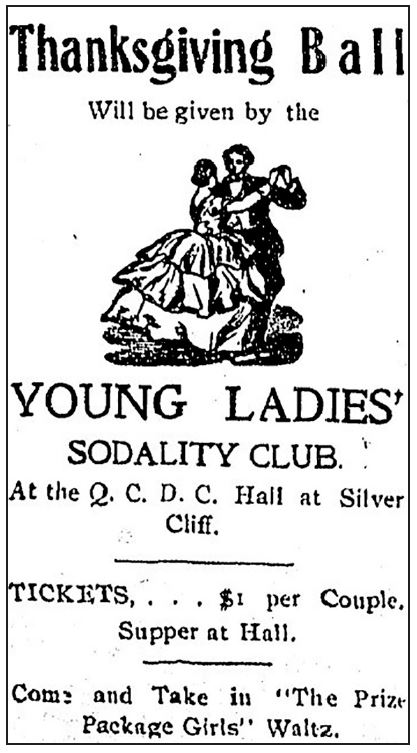As the turkey hangover slowly lifts from local residents, it may be a satisfying exercise to review Thanksgivings past. A trip through the Wet Mountain Tribune archives proved to be especially gratifying. Our Valley forbearers actually celebrated in a very festive public array of Thanksgiving events over a hundred years ago, when the holiday was still fresh and unencumbered with “tradition.”
Among them is the flirtation of romance at hand in a number of sponsored dances in the local halls. For example: Who those “Prize Package Girls” were are most likely lost in the mists of history since this advertisement ran on November 4, 1905. But the public events in the early 20th century were not always balls and frolic, contending with one another with featured bands and musicians. Some were more straightforwardly promoted as sporting events appealing to the wild game hunting already deeply ingrained in Valley culture. This appeal, published on November 24, 1900, is fairly typical of that once popular practice: of some unidentified curmudgeon at the Tribune, identified only as “Our Office Philosopher,” on November 20, 1914:
“Thanksgiving Day is one of about equal portions of anticipation and regret, with sixty minutes of delight intervening at 12 o’clock noon. The Thanksgiving dinner is the first of the winter season series of elastic meals, and is an emphatic corroboration of the phrase, ‘What fools we mortals be.’ The elasticity of the Thanksgiving dinner gives every home at least one thing to be thankful for. Think of its coming on Monday or Tuesday!

“Turkey became the primary Thanksgiving dish a long time ago, when the size of families demanded something of liberal proportions to go round. A quail is now sufficient to feed the average home, but there are usually enough relatives present on Thanksgiving Day to perpetuate the ordeal of coming in contact with a turkey. Our pilgrim fathers used to shoulder a blunderbuss and go out and bag the first turkey that gobbled at them, with no thought of to whom the bird might belong. We twentieth-century pilgrims consult our bank book, and if it agrees to back us up, we go out and buy one of the turkeys our forefathers left in cold storage for us.” So much for easy sentiment on the part of that anonymous Tribune “philosopher.”
Promotion of the day also became a part of patriotic fervor and political debate as well over those earlier decades. Especially bracketing the Great War, Tribune commentary went from pre-war gratefulness that this was Europe’s affair, to appeals for patriotic thankfulness for “our boys” at the front, to the post-war gratitude for victory and American values. And when FDR promoted moving forward the then wobbly date of Thanksgiving to boost the depression economy, the hue and cry of already traditionalists forced him to back down from the proposal.
In 2020, with the unique features of the time shaping all sorts of national conversation, the Valley seems content with hunkering down and moving cautiously forward. Ours is not to debate, as scholars still do, whether the feast at Plymouth really constituted the first Thanksgiving in the United States. (In 1565, for example, Spanish explorer Pedro Menéndez de Avilé invited members of the local Timucua tribe to a dinner in St. Augustine, Florida, after celebrating in a formal Thanksgiving Mass his crew’s safe arrival.) And some Native Americans, as well as other non-Native citizens, remain discontented with how the Thanksgiving story is presented to the American public, and especially to schoolchildren. That rather romantic narrative portrays sunny relations between the Pilgrims and the Wampanoag people, glossing over the long and bloody history of conflict between Native Americans and European settlers, resulting in the deaths of hundreds of thousands. Today, for example, the 55th observance of a “National Day of Mourning” will occur on Cole’s Hill, overlooking Plymouth Rock.
Here in the Valley, surrounded by a natural environment gifted to all who have dwelt here before us and now to us, it seems simple enough to reflect on simple gratitude and gather in from our present circumstances what we can that will keep us moving on. So we say from the heart to all our readers: Happy Thanksgiving!
– W.A. Ewing

